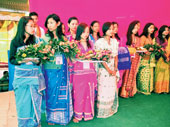 |
| Bodo girls in traditional dokhna. File picture |
Kokrajhar, April 2: The silk war of Sualkuchi has revived the All Bodo Students Union (Absu)’s demand to halt the import of traditional Bodo attire from outside the state.
A release issued by Absu president Promod Boro and assistant general secretary Somnath Narzary today sounded a “last warning” to all traders of traditional Bodo attire like aronai and dokhna and set a week’s deadline to stop bringing and selling these from outside. The union had issued a similar ultimatum last year.
The dokhna is worn by women while aronai is a scarf offered to guests as a gesture of welcome at various functions like weddings.
The Absu’s reiteration of the demand comes close on the heels of the unrest that broke out in the silk town of Sualkuchi over traders stocking a mix of Benarasi and Assam silk products and often passing off the former as the local variety, thus affecting the weavers’ livelihood.
Raising the issue, the Absu said it had appealed to traders last year to stop selling aronai, dokhna and gamosas made outside the state as these would destroy traditional values and adversely impact the economy of “our women and weavers.”
However, some “anti-traditional and anti-cultural and commercial people” were continuing the business with the help of some influential people, it added.
The Absu statement said the imported attire only benefited some people and had nothing to do with the preservation of “our culture for which we are struggling for decades, they do not bother about ruining our culture and traditional values”.
While setting the deadline for traders to fall in line, the Absu instructed its district committees to take necessary action.
Boro said Absu would discuss the matter with all traditional Bodo weavers soon and take initiatives to satisfy the market needs of traditional attire for different purposes.
A section of businessmen have been allegedly trying to commercialise traditional Bodo attire by importing machine-made ones from neighbouring states, thus threatening the very existence of the traditional art of weaving.
Sources said over 150 private weaving centres — around 25 in this town alone — had closed down in the district because of supplies from outside. “Since the machine-made dokhnas are becoming available in every nook and corner and at a cheaper price, the weavers in the villages have stopped working. If this trend continues, the Bodos will lose their unique design and hand-weaving,” said a local entrepreneur who has a weaving centre of her own.
“The flooding of machine-made dokhna and aronai brought from neighbouring states is posing a threat to traditional weaving, besides degradation of quality,” she added.
The imported version of clothes, which are cheaper and of inferior quality, have a huge market among the lower and lower-middle classes. The price difference is around Rs 100 to Rs 200 in case of dokhna and Rs 50 to Rs 100 in case of aronai. A retailer in Kokrajhar, however, said supply of clothes from outside had declined over the past five-six months.
The Absu expressed solidarity with the “genuine weavers of Sualkuchi” in their protest against the import of traditional Assamese dresses from outside which are inferior in quality and affect the traditional economy.
“The weaving craft of Sualkuchi is not only the economic lifeline of the people living there but also a vital initiative to preserve and reflect the rich Assamese culture in the world,” Boro said.










